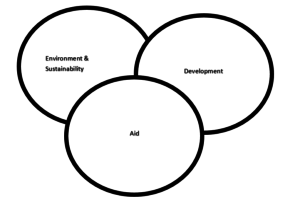I am proposing to research the debates on sustainable development because I want to find out how external forces limit or expand sustainable development practices in order to help my readers understand why countries are unable to achieve environmentally conscious goals. I want to first recognize my understanding that this is still a broad topic. I hope that as I further examine that type of method I want to use in the research, I will be able to decide if I want to focus on a trend or examine specific cases. I would also like to acknowledge that when generalizing a group of countries, there are many debates on what terms should be used. My research on this topic alone has been basic to this point and for the purpose of this post, I will use the terms “developing” and “developed” countries to describe countries with different economic statuses.
With overlapping and equal interests in environmental sustainability, international aid, and the concept of development, I decided that the umbrella of my broad research topic should examine the debates on the ideology of “sustainable development.” The idea of sustainable development initially appeals to a self-proclaimed environmentalist as me. What better way to encourage development than in a sustainable fashion? We are encouraged to learn from history and our past mistakes. The United States is a “developed” country and has generally understood that the method of development that they participated in has depleted natural resources and harmed ecosystems. As the United States encourages developing nations to “catch-up” to their standards, the hope to encourage this process sustainably is to make up for past mistakes by already developed nations. Whereas the developed nations are now encouraged to shift to environmentally conscious lifestyles, developing nations have, for a lack of a better word, the opportunity to start environmentally conscious at the beginning. The United Nations considers sustainable development as one of their top priorities and have even released a platform of these 17 carefully chosen goals. In 2016, Prime Minister Erna Solberg of Norway convinces us that sustainable development is a gateway to economic equality.1 On the other side, as this term began to rise in the 1990s, critics worried that the concept failed to understand the depth of poverty and environmental degradation, dismiss economic growth have incomplete perceptions on sustainability and participation.2 This debate is important to resolve to the best of our ability because the time to save our planet from utter environmental catastrophe is running out. Drastic changes need to be made immediately and we must consider each country’s role in the process.
This massive umbrella topic is essential for understanding how countries see their role in the development of other countries. Many questions arise. How influential is their role? How important is their role? Do they limit or expand sustainable development? Should they influence or encourage “development”? Development itself is a difficult term to wrestle with but my understanding how external forces view and promote this concept will be useful in this research. To examine this further, I have already examined a few theories of development. W.W. Rostow proposes “stage theory” and that there are five stages of development.3 This theory focuses on an individual country’s internal process. Andre Gunder Frank has a different perception because he believes in “dependency theory.” It is a theory based on historical experiences of both developed and developing countries.4 This theory allows for examination of external factors, especially foreign actors. These are just two theories that consider when examining development and this preliminary research has allowed me to realize that for this research topic I would use the lens of dependency theory.
This topic is important now more than ever because of the climatic tipping point. 5 This research is motivated by keeping climate change in this discussion because it is vital to understand the importance and the time-sensitivity of this issue. The concepts of sustainability and development, both individually and as a phrase, have been at the forefront of debates, policy, and actions internationally. We must analyze and be open to criticism of the role of foreign actors in the development process. The idea of sustainability to this topic has increased the delay in concrete international decisions when it should be exactly the opposite. Conducting this research will allow for appropriate international action.
- What explains the success and failures of imposing sustainable development practices?
- What explains the success and failures of the United States’ role in implementing sustainable development practices in Haiti?
*Note: Considering comparing the United States’ role in multiple countries or how another developed country has influenced another developing country.
- Erna Solberg. “Key-note speech.” Speech, High Level Forum on Sustainable Development, New York City, NY, July 18, 2016.
- Sharachchandram Lele. “Sustainable Development: A Critical Review,” World Development 19, no. 6 (1991), 607.
- W. Rostow. “The Five Stages of Growth” in Development and Under Development eds. Mitchell Seligson & John Passe-Smith (London: Lynne Reinner, 1998), 10-16.
- Andre Gunder Frank. “The Development of Underdevelopment” in From Modernization to Globalization: Perspectives on Development and Social Change J. Timmons Roberts & Amy Hite. (Oxford: Blackwell Publishers, 2000) 159.
- Summer K. Praetorius & Alan C. Mix. “Synchronization of North Pacific and Greenland Climates Precede Abrupt Deglacial Warming,” Science 345 no. 6195 (2014). 4444.
Bibliography:
Frank, Andre Gunder. “The Development of Underdevelopment” in From Modernization to Globalization: Perspectives on Development and Social Change eds. J. Timmons Roberts & Amy Hite. (Oxford: Blackwell Publishers, 2000) 159-168.
Lele, Sharachchandram. “Sustainable Development: A Critical Review,” World Development 19, no. 6 (1991), 607-621
Praetorius, Summer K. & Alan C. Mix. “Synchronization of North Pacific and Greenland Climates Precede Abrupt Deglacial Warming,” Science 345 no. 6195 (2014). 4444-4448
Rostow, W.W. “The Five Stages of Growth” in Development and Under Development eds. Mitchell Seligson & John Passe-Smith (London: Lynne Reinner, 1998), 10-16.
Solberg, Erna. “Key-note Speech.” Speech, High Level Forum on Sustainable Development, New York City, NY, July 18, 2016.
